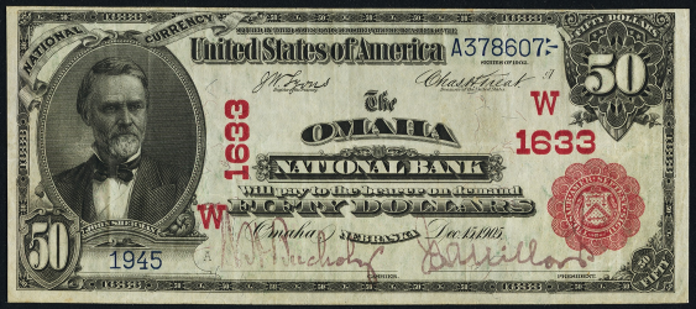Fifty Dollar Notes › Nationals › 1902 Fifty Dollar National Bank Notes › West Virginia Charters › 1902 $50 Madison West Virginia Madison National Bank
Get Value Now
| Item | Info |
|---|---|
| Series | 1902 |
| Charter | #6510 Madison National Bank of Madison, West Virginia |
| Year Chartered | 1902, 492 Banks Chartered |
| City Info | Madison is a city and former coal town in Boone County, West Virginia, United States. The population was 3,076 at the 2010 census. It is the county seat of Boone County. Madison was first established as Boone Court House. The town was renamed about 1865, presumably for James Madison, the fourth president of the United States. Other theories hold that it was named for lawyer James Madison Laidley or for Madison Peyton, a pioneer coal operator, who was a leader in the movement which resulted in the formation of Boone County and for whom Peytona on Big Coal River was named. Madison was incorporated in 1906. Source: Wikipedia |
| Similar Cities | 24 banks with similar city. First 12 below: 1. Madison, Indiana - First National Bank 2. Madison, Wisconsin - First National Bank 3. Madison, Indiana - National Branch Bank 4. Fort Madison, Iowa - Fort Madison National Bank 5. Madison, New Jersey - First National Bank 6. Madison, South Dakota - First National Bank 7. Madison, South Dakota - First National Bank 8. Madison, South Dakota - Madison National Bank 9. Madison, Nebraska - First National Bank 10. Fort Madison, Iowa - First National Bank 11. Madison, Maine - First National Bank 12. Madison, Kansas - First National Bank |
| Seal Varieties | Red, Blue |
| Other Info | 1. Value depends on notes known for charter, condition and market demand. |
| Neat Fact | Notes of Aldrich-Vreeland Period (1908-1915) contain inscription "Secured by United States bonds or other securities" (Friedbergs, 20th Ed. P 100) |
No Obligations Offers and Appraisals
Please submit a good photo or scan. It will be identified and evaluated. Understand there may be subtle differences between the image you see above and your note. Signatures, design, markings and note condition will determine the offer price. Notes in Uncirculated or better condition receive the best offers.
Appraisals can be estimated for wholesale and retail prices. Wholesale is what dealers typically pay. Retail is what a collector might pay. Retail is slightly higher in most cases.
Please visit this page for USA Paper Money Reference. Do not treat this page as a reference guide, it is for appraisal and acquisition purposes only.
